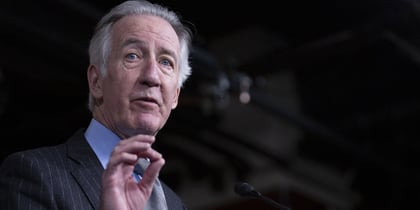What You Need to Know
- Ways and Means Committee is working on legislation that will stop IRAs from being exploited, Neal said.
- Peter Thiel's Roth IRA investment is absolutely legal, says IRA expert Ed Slott.
- But Thiel isn't totally out of the woods for eventual tax exposure, Slott said.
House Ways and Means Committee Chairman Richard Neal, D-Mass., is mulling legislation that would limit “the total amount of money that can be saved in tax-preferred retirement accounts, and putting an end to the tax dodging some do when saving in IRAs,” he told ThinkAdvisor Thursday in an email.
“Incentives in our tax code that help Americans save for retirement were never intended to enable a tax shelter for the ultra-wealthy,” Neal said, referring to recent reports about Peter Thiel’s $5 billion Roth IRA. “The Ways and Means Committee is working on legislation that will stop IRAs from being exploited.”
Senate Finance Committee Chairman Ron Wyden, D-Ore., also plans to reintroduce legislation he floated in 2016 that would have limited the amount of money that could be invested in Roth IRAs, according to ProPublica.
Wyden told ProPublica that “If I had my way back in 2016, my bill would have passed, there would have been a crackdown on these massive Roth IRA accounts built on assets from sweetheart deals. I feel very strongly that the IRA was designed to provide retirement security to working people and their families, and not be yet another tax dodge that allows mega millionaires and billionaires to avoid paying taxes.”
ProPublica, an investigative news outlet, reported the story about Thiel’s massive Roth IRA in an article, “Lord of the Roths: How Tech Mogul Peter Thiel Turned a Retirement Account for the Middle Class Into a $5 Billion Tax-Free Piggy Bank.”
Thiel’s Move ‘Absolutely Legal,’ Ed Slott Says
IRA expert Ed Slott of Ed Slott & Co. told ThinkAdvisor, however, that “contrary to all the stories about Thiel’s massive Roth IRA, what he did was absolutely legal. He followed the Roth IRA tax and contribution rules and did nothing wrong. He just happened to have a lottery-ticket investment in his Roth IRA. I wish that for everyone.”
Thiel’s contribution to his Roth IRA, Slott explained, “was $2,000, which was the legal limit in 1999 when he made the contribution. He was able to do it because his income was under the Roth contribution income limits at that time.”
Also, Slott said, Thiel’s “was an investment in a startup company so this was not a prohibited transaction as some have said it was. It’s true that you cannot invest your IRA (or Roth IRA) funds in your own business since that is self-dealing and a prohibited transaction which would disqualify an IRA or Roth IRA. But Thiel did not do this.”
What Thiel did was “merely invested $1,700 of his $2,000 Roth IRA funds in PayPal stock as a startup at the price of one-tenth of one cent ($0.001) per share. He bought 1.7 million shares and they grew and grew in his Roth IRA for multibillion-dollar gains — all totally legal,” Slott maintained.
Published reports and members of Congress have stated “that was not the original intention of the Roth IRA. I disagree! This absolutely was and still is the intention of the Roth IRA. Earning a return is exactly the intention of making any investment,” Slott said. “And if you can do this in a tax-free account like a Roth IRA, that’s even better. That’s just good tax planning and all perfectly legal.”
Congress and Roths
What does Congress think “needs to be ‘reined in?’” Slott said. “Are they going to limit how much money you can earn on your IRA or Roth IRA investments? That’s ridiculous. Then what would be the purpose of risking money on any investment?”









 July 08, 2021 at 10:22 AM
July 08, 2021 at 10:22 AM











